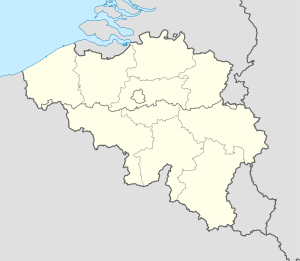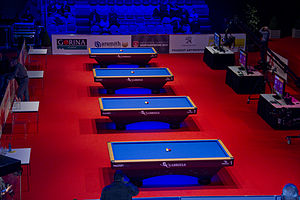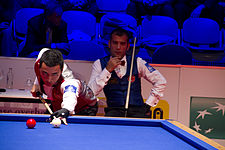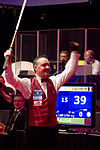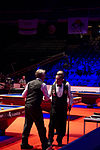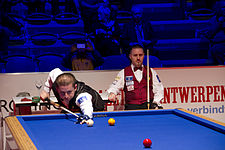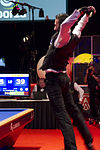Three Cushion World Championship 2013
| 66th Three Cushion World Championship 2013 |
|
|---|---|
| Tournament dates | |
| Tournament type: | World Championship |
| Tournament format: | Round robin , knockout |
| Organizer: | UMB |
| Tournament details | |
| Venue: | Lotto Arena, Antwerp , Belgium |
| Opening: | October 16, 2013 |
| Endgame: | 20th October 2013 |
| Attendees: | 48 |
| Defending champion: |
|
| Winner: |
|
| 2nd finalist: |
|
| 3rd place: |
|
| Prize money: | € 35,200 |
| Records | |
| Best GD: |
2,642 Kang Dong-koong |
| Best ED: |
5,714 Kang Dong-koong |
| Maximum series (HS): |
17 Frédéric Caudron |
| Venue on the map | |
| ← 2012 | 2014 → |
The 2013 three-cushion world championship took place from October 16 to 20 in the Belgian diamond city of Antwerp . It was the third three-cushion world championship in Antwerp after 1953 and 1974.
The world championship in the three cushion carom variant has been held since 1928. The defending champion was Eddy Merckx from Belgium .
Tournament commentary
The second registered Italian player Emilio Sciacca (Italian runner-up in 2011 and third in 2013) canceled the tournament , alongside Marco Zanetti . The national association FIBA (Fédération Italienne de Billard Amateurs) nominated Andrea Bitetti (Italian runner-up 2013) for him.
The Ecuadorian Juan Carlos del Salto has the worst chances of participating in the finals with zero world ranking points in 1229th place. To make matters worse his group opponents Tayfun Taşdemir (# 16) from Turkey and the Korean Lee Choong-bok (# 17). The Portuguese Mario Aranha (# 467), the Colombian Huberney Cataño (# 369) - he was able to catapult himself up several hundred places after winning the national championship - and Michael Kang (# 395) from the USA. Despite his age, Kang has relatively good chances. He is one of the top US players and has won several US championships. His low ranking position results from the fact that, like many Americans, he almost does not take part in international tournaments and so cannot collect any points for the world rankings. Kang was a good friend of the late Sang Chun Lee , with whom he founded the Carom Café in New York City and runs it to this day. The Verhoeven Open has been taking place in his salon since 2011 .
General information
The UMB rules for three-band / singles apply (as of June 29, 2013). The group stage is played in 16 groups of three, the first placed go to the round of 16.
Participation fee:
- € 200
Expense allowance:
- Continental players: € 500
- Intercontinental player: € 700
Game sequence:
- Player 2 versus Player 3
- Player 1 versus loser 2/3
- Player 1 versus winner 2/3
The rating is as follows:
Time regulation:
- 40 seconds per push.
- After the time has elapsed (acoustic signal), the ball is placed again for the opponent.
- Two extensions per set within the 40 seconds are possible, new time limit: 80 seconds.
- Qualifying round: Yes, both players get one point in the event of a draw.
- Final round: Yes.
Prize money and world ranking points
| space | total | Points |
|---|---|---|
| winner | € 4,800 | 120 |
| finalist | € 3,200 | 81 |
| 3rd & 3rd place | € 1,600 | 57 |
| 5th - 8th place | € 1,200 | 39 |
| 8th - 16th place | € 800 | 24 |
| 17th - 32nd place | 400 € | 12 |
| 33rd - 48th place | 8th | |
| total | € 35,200 |
In addition to their prize money, the winner will also receive a queue, donated by the “Antwerp Diamond Center”.
Attendees
The field consists of 48 players, with the defending champion Eddy Merckx being automatically entitled to participate. The other 21 players at the top of the world rankings (places 2–22) are invited directly. Places 23–46 are nominated by the individual continental associations, with the following breakdown: Europe ( CEB ): 10, new additions since April 2013 are Africa ( ACC ): 2, America ( CPB ): 8 and Asia ( ACBC ): 4 The places 47 and 48 are allocated via wildcards from the host association (here: CEB).
|
|
||||||||||||||||||||||||||||||||||||||||||||||||||||||||||||||||||||||||||||||||||||||||||||||||||||||||||||||||||||
Group stage
description
In Group A, in which the defending champion always plays, the first round started with a purely Belgian encounter. Eddy Merckx had few problems with his compatriot Peter Ceulemans and won with 40:24 in 34 shots. Peter Ceulemans, nephew of the most successful three-cushion player of all time, Raymond Ceulemans, also lost his second game against the Vietnamese Dinh Nai Ngo with 39:40 in 39 pictures. The decisive match for group victory was decided by the world champion with a world class performance of 40:14 in 16 shots.
The start in Group B was pretty tough. After 38 long recordings, the Egyptian Riad Nady surprisingly prevailed against the Equadorian Javier Teran. As a result, in round two there was already a decisive match between four-time world champion Torbjörn Blomdahl and Javier Teran. There was also a big surprise here. Teran won with 40:27 in 28 shots. So Blomdahl had to win the last game against Nady with a maximum of 33 shots in order to reach the knockout phase. Blomdahl showed his nerve and won in 35 shots. So the first surprise was perfect.
Frédéric Caudron showed his outstanding form in Group C and won both games with 40:13 in 26 and 19 shots.
In Group D, the Korean Heo Jung-han started with a 40:31 victory in 27 shots against the Dane Michael Lohse. The French Jérémy Bury, actually the favorite in the group, fought his way back after a clear deficit against Lohse. But Lohse was able to finish the game in 27 shots. In the follow-up, Bury managed a draw. In the decisive match for group victory, Heo started very well and quickly had a big lead. Bury, who had to win to advance, fought his way back, but lost just 39:40 in 29 shots and was eliminated.
Ex-world champion Marco Zanetti showed outstanding form in Group E. He won against Egyptian Khaled Salem with 40: 8 in 14 shots and against Belgian Jozef Philipoom with 40:33 in 18 shots. Zanetti played the best average of the preliminary round with 2,500 and was thus number one on the seeding list for the knockout round.
Group F started with a victory for Japanese Kouiji Funaki against Arnim Kahofer from Austria. The second round brought a sensation. Kahofer, actually a cadre specialist, won against the 3-time three-cushion world champion Daniel Sánchez from Spain with 40:28 in 23 shots. Sánchez had to improve significantly in the last game to reach the round of 16. He also succeeded in doing that with a world class performance against Funaki. In just 15 shots he won with 40:15.
The clear favorite in Group G was Dick Jaspers. After a hard-fought 40:28 win against his compatriot Jean Paul de Bruijn, he also won his second game in very good 19 shots against the Czech Martin Bohac with 40:13 in 19 shots.
For the German Christian Rudolph, the tournament in Group H started rather uncomfortably. The American Pedro Piedrabuena, reigning Pan America champion, started very well and was well in the lead. After the 5-minute break, halfway through the game, Rudolph was able to catch up with a series of 9 and finally won with 40:30 in 29 shots. Since Piedrabuena, who takes too little part in international tournaments, also lost his second game, the last game had to bring the decision. Against the Korean Choi Sung-won, who had a great start and was leading 19: 1 after 3 shots, Rudolph had no chance in the end and lost with 20:40 in 24 shots.
In the very balanced group I, the Korean Kim Kyung-roul prevailed at the end. Everyone had won a game and so the better average decided. Here Kim was the best with 1,450.
There was a final in the group J. Nikos Polychronopoulos and Cho Jae-ho each won their first game. Since Cho needed fewer shots, a draw was enough for him to win the group. In the final game, however, the Greek Polychronopoulos showed his whole class and only needed 12 shots for his 40:22 victory. Cho was eliminated with an average of 2,000.
Group K was dominated by the ex-world champion Filipos Kasidokostas. He won both games against the youngest participant in the World Cup, William Villanueva from Venezuela, and the Japanese O Takeshima.
The group that could not be surpassed in terms of surprises was group L. In the first game, the winner of the World Cup tournament in Guri Kang Dong-koong, Korea, had to play against the Colombian Alexander Salazar. Kang was the favorite but ended up being beaten by a 13-series from Salazar. In the second game of the group there was an encounter between Kang and the strong Turk Lütfi Çenet. Kang, still shocked by the first defeat, approached the game very focused. After just seven shots, he had reached 40 points. His average of 5,714 was the setting of Eddy Merckx's world record. Now Kang had to hope for Çenet in order to reach the round of 16. Unfortunately, the Turk showed too little resistance in the last game, lost with 32:40 in 28 shots and Salazar was through. Kang was eliminated with an average of 2,642. This has never happened before.
There were also surprises in group M. Favorites were actually Belgian Eddy Leppens and ex-European champion Murat Naci Çoklu from Turkey. If all three players were equal, however, the Colombian Huberney Cataño prevailed with the best average of 1.360.
Group N started with a great game by Belgian Roland Forthomme. Against the American Michael Kang, Forthomme ended the game with a 16 series. Since the Turk Adnan Yüksel also won against Kang, the last game had to bring the decision again. Here, however, the Belgian was completely irrelevant. Yüksel won after 33 shots with 40:29 and was further.
The second German participant, Martin Horn, played in group N. The first game in the group ended with a victory for the young Egyptian Sameh Sidhom against the oldest participant in the tournament, Mario Aranha from Portugal. Martin Horn had a very difficult time in his first game against Aranha. The very defensive Portuguese led to the break. Thanks to a 10-series, Horn turned the game and won in 26 shots with 40:31. Horn was also behind at half-time against Sidhom. The Egyptian also played a series of 10s. After the break, Horn played in world class form and won 19 recordings with 40:33.
Group P was dominated by the Turk Tayfun Taşdemir. He won against the Ecuadorian Juan Carlos del Salto and the Korean Lee Choong-bok in 21 and 18 shots, had the second best GD among the qualified players and was second on the seeding list in the KO round.
Game statistics
The number behind the dots indicates the number of shots.
| Legend | ||||
| Abbr. | meaning | Abbr. | meaning | |
|---|---|---|---|---|
| MP | Match points | HS | Maximum series | |
| SV | Sentence ratio | ED | Single average | |
| GD | General average | BSD | Best sentence average | |
| BED | Best individual average | PP | Game points | |
| BG | Best sentence average | BMD | Best team average | |
| Pt. | points scored | GUV | G ewonnen- U nentschieden- V erloren; Points 2-1-0 are awarded in this order | |
| Recording | required recordings | Group winners advance to the final round | ||
| Possibly. not all terms apply or some are not listed. These can be looked up in the list of collision terms . | ||||
Final round
description
Round of 16
Session 1
In a very close game between Marco Zanetti and Javier Teran, the lead kept changing. In the 36th recording, Zanetti finally ended the game. Teran managed the required two points for a tie in the second half. A penalty was necessary. Zanetti started with two points and then had an almost insoluble position on the table. After some thought, he decided to play the almost pressed ball as a five-ribbon. Many of the players present felt it was a breakthrough. The referee counted the point and Zanetti added three points to six. When Teran started to push, a photographer took a picture with a flash. This irritated Teran so much that he skipped the second shot and lost the game. The Ecuadorian was understandably angry about this incident and confronted the photographer. It then turned out that it was a viewer with a cell phone camera directly behind him who was taking the picture at the same time. But there was no repetition for Teran.
The Colombian Alexander Salazar, actually a blatant underdog against the vice world champion Choi Sung-won from Korea, created the biggest surprise of the last sixteen. Salazar finished the game on the 24th shot. Choi only managed two points in the second half and was eliminated.
The beginning of the game went perfectly for the German Martin Horn. With a 14 series in the third shot, he quickly led 19: 1. Without getting into serious problems, he finally won with 40:19 in very good 19 shots against the Turkish Adnan Yüksel.
In a high-class game between the two ex-world champions Frédéric Caudron (1999) and Daniel Sánchez (1998, 2005 and 2010), the Belgian Caudron continued his winning streak and ultimately won 19 shots with 40:31.
Session 2
The Korean Kim Kyung-roul and the Greek Nikos Polychronopoulos played a thrilling match. Neither of the two had a bigger lead in the game. With a score of 37:37 in the 24th shot, Kim made three points and ended the game. Polychronopoulos also made three points to 40:40 in the follow-up. Again, the game was only decided in the penalty. Kim made only one point. The Greeks couldn't manage any more. 1: 1. In the second penalty, Kim only managed one point. This time Polychronopoulos scored two points and was in the quarter-finals.
There was also a great match between Filipos Kasidokostas and Heo Jung-han. At 27:24 in 17 shots for Kasidokostas, Heo made a series of 12. Many assumed that this was the preliminary decision. But the Greek showed no nerves and countered with a series of nine points. Heo null in the next shot. Kasidokostas made the last four points. The Korean only scored two points in the second push and was eliminated.
The defending champion Eddy Merckx had to deal with the 3-time world champion Dick Jaspers. At 16:15 in the 11th shot for Jaspers, Merckx made a series of eleven points and took the lead with 26:16. After the break, Jaspers came over to the table, made a point and started walking towards the chair. A counterattack from Ball 2 to Ball 3 resulted in the regular collision and Jaspers made four more points. With continued strong play, Jaspers reached 40 points in 20 shots. Merckx only managed two points in the night kick and the defending champion was eliminated.
Real title chances were given to the Turk Tayfun Taşdemir after his performances so far. He also showed no weaknesses in the round of 16 and won with 40:19 in 22 shots against the young Colombian Huberney Cataño.
Quarter finals
Session 1
Marco Zanetti, who excelled in the preliminary round, was unrecognizable in the quarterfinals against the Colombian Alexander Salazar. In no phase of the game did he show normal form against his student from South America and finally lost with 23:40 in 25 shots.
In the second quarter-finals, Frédéric Caudron and Martin Horn faced each other. Both had the same general average of 1.777 at this point. After a moderate start, Caudron made a series of 17 points in the 14th shot and decided the game in the next shot with 40:16 in 15 shots in his favor.
Session 2
The two Greeks played a great game in the quarter-finals. At the break, Kasidokostas led with 26:12 in only 6 shots. With 14 points in 5 shots, the second half of the game was also world class. In the end it was 40:24 in 11 shots for Kasidokostas. The averages: 3.636 to 2.181.
In the last quarter-finals between Jaspers and Taşdemir, the game was completely even up to the 10th acceptance. Then Taşdemir played a series of eleven points and pulled away. After the break at 26:34 for Taşdemir, Jaspers made a series of eight points and equalized. After two times three points, Jaspers had reached 40 points. Taşdemir only managed one point in the follow-up and was eliminated.
Semifinals
In the semifinals, the Colombian Alexander Salazar showed nerves against Frédéric Caudron. After three points in the first recording and one point in the third recording, he played 14 incorrect recordings in a row and was 4:26 behind. In the 22nd recording, Caudron ended the game with a series of 12 at 12:40.
The second semi-final was more even. Jaspers was 11:25 behind in eight shots at the break. In the last six shots he scored 18 points, but in the end he had to admit defeat to the Greek with 35:40 in 19 shots. Kasidokostas was in the final for the fourth time in the last eleven years.
final
After a balanced initial phase, Kasidokostas slacked off and also played a little unlucky. In Caudron's eleventh take on a series of eight points, the ninth point was extremely close. The referee wanted to count the ninth point. But after an objection from Kasidokostas, Caudron confirmed that the point was a two-band and it went into the break. After the break, Caudron continued to score and ended the game to great applause from the 1,500 spectators. After 1999, he was three-cushion world champion for the second time.
Game statistics
The tournament tree for the final round is listed below. The game is played at 40 points with a kick . In the event of a draw , the decision will be made with a penalty .

Ludo Dielis , as organizer, hands over the “winning queue” to Frédéric Caudron .
From left to right: Filipos Kasidokostas , Caudron, Alexander Salazar, Dick Jaspers .
Closing table
|
|||||||||||||||||||||||||||||||||||||||||||||||||||
Web links
Individual evidence
- ↑ Achievements of Emilio Sciacca. On: Kozoom.com. Retrieved October 1, 2013.
- ↑ Successes of Andrea Bitetti. On: Kozoom.com. Retrieved October 1, 2013.
- ↑ a b player list. (PDF; 182 kB) On: UMB.org. Retrieved October 1, 2013.
- ↑ Carom Cafe Billiards. Retrieved October 1, 2013.
- ↑ a b three-band world championship rules of the UMB. (PDF; 139 kB). Retrieved September 12, 2013.
- ↑ Prize money and general information. (PDF; 123 kB) On: UMB.org. Retrieved September 12, 2013.
- ↑ Diamond cue for the new world champion. On: Kozoom.com. Retrieved October 18, 2013.
- ↑ List of participants. (PDF; 182 kB). On: UMB.org. Retrieved September 12, 2013.
- ↑ Group allocation (PDF; 1.2 MB). On: UMB.org. Retrieved September 12, 2013.
- ↑ Results of the group stage (PDF; 301 kB). On: UMB.com. Retrieved October 1, 2013.
- ↑ Timetable (PDF; 90 kB). On: UMB.com. Retrieved October 1, 2013.
- ↑ Results of the round of 16. (PDF; 85 kB) p. 1 , archived from the original on October 19, 2013 ; accessed on October 19, 2013 (English).

